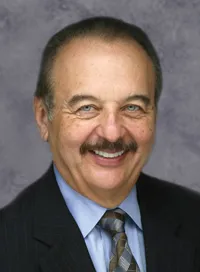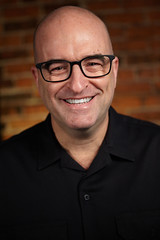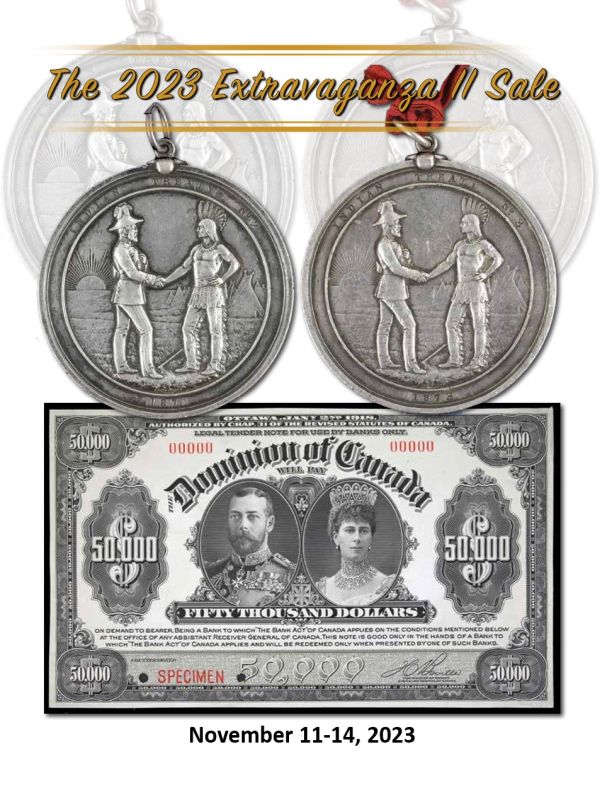
PREV ARTICLE
NEXT ARTICLE
FULL ISSUE
PREV FULL ISSUE
RON GILLIO INTERVIEW, PART FOURGreg Bennick's latest interview for the Newman Numismatic Portal is with longtime dealer Ron Gillio. Here's the fourth of five parts, where Ron discusses fellow dealers Abe Kosoff and Sol Kaplan. -Editor
GREG BENNICK: I really like hearing that. And I actually have a couple of people
in the industry who have sold me coins. One in particular that I remember just last
year sold me a quite expensive counterstamp coin. And I couldn't possibly pay for it
at the time. And he wrote on the invoice,
RON GILLIO: Yeah, I know. And just going back to the Silver Certificate days,
Sam Coppell in Los Angeles, one of the dealers that I was buying Silver Certificates
from, and one time I couldn't pay him. I'll never forget it because not only he said,
GREG BENNICK: Now, Lester was doing quite a few auctions. I know that I own quite a few of his auction catalogs. I know he was doing auctions constantly. You were doing auctions as well, either at the time or shortly thereafter. Isn't that, right? RON GILLIO: Well, like I said, in 1967-68, I was in the auction business with Paul Koppen here where I had auctions in Van Nuys. Then I started having my own auctions at the Long Beach Coin Show in the 90s, maybe late 80s. GREG BENNICK: Okay. So, it was a bit later, but still. RON GILLIO: Long Beach Coin Show and different coin shows, I would have auctions. They started about 1983 because I had a certified coin auction when PCGS started in 1986. And then I also started having auctions in Hong Kong and I started running shows in Hong Kong in the 1980s. So totally, I had auctions in Hong Kong, Japan, and the US. I had a total of about 80 some odd auctions all through my career. GREG BENNICK: Now, the auctions that you were doing in Hong Kong and Japan, because we focused our conversation so far on Switzerland, how did you make it over to Hong Kong and Japan? And were you buying and selling Chinese coins and Japanese coins or were you selling US coins in Hong Kong and US coins in Japan? RON GILLIO: In Japan, it was an interesting question you asked because one of the coins that's really popular in Japan is a $10 Indian gold coin. It was used for jewelry. This is in the 1990s now, maybe late 1980s. But I would go to Switzerland, buy rolls of $10 Indians, 50 coins through a roll, fly directly from Zurich to Tokyo and sell them there. And that kind of got me interested in also Asian coins. So, I started dealing in Japanese coins. I'd find Japanese coins in Europe and then I'd bring them to Japan and sell them. Same thing with the Chinese coins. I got interested in the Chinese coins. So, I started buying the Chinese coins in the United States along with the Japanese coins and then selling them in Japan and Hong Kong. And then not buying, I never really bought too much US coins in Asia. I did buy some, but not very many. GREG BENNICK: Were people in Hong Kong and Japan, were they interested in slabbed coins as that took off or were they more interested in raw coins like you mentioned for jewelry? RON GILLIO: Well, during the time I was doing it, there was just raw coins. I mean, I did go to Japan. I did take David Hall to Japan on a trip. We went to a coin show together and I helped him promote PCGS. This was in ‘88, ‘89. And they started getting interested in the slabbed coins then, which they are now. But during the time when I went over there, there was really no slabs yet. It didn't really kick in until the 90s. So, most of my auctions were raw coins and I'd get quite a few consignments from people in Hong Kong at the time for Chinese coins in my auction. But yeah, that was my extent of the auction business. And then I had auctions in San Francisco with Bob Johnson and Butterfield's Auction Gallery. And like I said earlier, now I'm with Stack Bowers getting consignments for Stack Bowers auctions. GREG BENNICK: You mentioned the Long Beach show. When did you first start going to the Long Beach show? RON GILLIO: Long Beach show started in ‘63 or ‘64. I started going around that same time, around the first or the second show. It's interesting. I don't know if many people know how the Long Beach coin show got started, but I'll tell you the story. GREG BENNICK: Please do. RON GILLIO: So, the big show, as I said earlier, was the Southern California Numismatic Association at the Statler-Hilton in Los Angeles. It was a big show. And there were two-coin dealers that got kicked out of the show. It was Ray Lungern from Century Stamp & Coin in Los Angeles and Sam Frodicus from, he had a coin shop in Long Beach, California. They got kicked out of the show for some reason. I don't know why. They wouldn't let them have a table. So, Sam, Trader Sam and Ray Lungern just decided to have their own show and they opened the show in Long Beach. So that's what got Long Beach started. I think it's again; I think it's 1964. And so, they started the show in Long Beach. And so, I attended the Long Beach coin show every year since the sixties. And then I bought it from the owners at the time, which was Sam Lopresto in 1992. And then I ran it from 1992 to 2005. And then I sold it to David Hall at PCGS and PCGS still owns it. GREG BENNICK: What was it like running the Long Beach show? I mean, you must've been the focus of a lot of attention, but also probably had to put out a ton of energy and coordinate so many different people. And just what are your memories of that? RON GILLIO: Well, since I had the experience of running the coin show in the past and running auctions, I mean, I had a grasp of how to do it. And it was just like you said, it was just coordinating people. I had a good staff of people working for me and organizing the show and you'd hire a decorator. And the biggest challenge was dealing with all the dealers, you know, want everything a certain way, which is okay. So, it was an interesting experience. I enjoyed it. I enjoyed running the show. And I mean, at the same time running the show, I still attended the show and bought and sold coins.
GREG BENNICK: Now, as I understand it, I might be completely off base here. I
understand that the early Long Beach days were RON GILLIO: Well, it was, the coin show was always very exciting, very energetic. There was a lot of things going on around the coin show, like poker games and wild parties. I would imagine. I mean, I sort of remember some myself, but it was very, things were different then because we didn't have the internet during that majority of the time that I went to the Long Beach show. So, it was exciting to see what you could find at the show. And a lot of dealers would come just to sell at the show. And a lot of dealers would come just to buy as they do today. And it was very exciting. It was very exciting. GREG BENNICK: Sounds great. Now what's overall, even Long Beach aside, what has been your favorite show to attend over the years? RON GILLIO: Favorite show. Well, I mean, I think the most interesting show and my favorite show is the American Numismatic Association shows, because that's even like just recently in Pittsburgh, it's a show you go to, you see some people, you only see them there. And that's the only show that they go to, whether it be collectors or dealers. And it's a who's who of people, numismatists and collectors and important people in our industry. And there's a lot of great educational talks. I always take time out to go see the exhibits. And so, I would say my favorite is the ANA shows. Although I like going to the shows, I still go to shows in Europe, which are a little bit different than the shows here, even the way they display their merchandise. So those are always fun to go to, too. I still attend some of those. GREG BENNICK: How do they display their merchandise differently? RON GILLIO: Well, today, like the last European show I was at was in Monaco. And you go to the show and there's some standard tables that have the showcases and the coins in the showcase. But traditionally, and there's still a majority of the dealers lay their coins out on little trays. No, not in showcases. They lay them on little trays where you can actually pick up the coins and look at them or even the slabs. They're not in cases and they just display things different is what they do.
GREG BENNICK: It's interesting you mentioned that because I know that Morton
& Eden has an auction of quite exquisite ancient Greek coins coming up. And when
I saw them recently, they had their coins just in trays and they were happy to show
me coins that were well beyond what I would be purchasing. But they absolutely
pulled them out, said, RON GILLIO: Right. And like I say, they're not even at the European shows where I saw Morton & Eden's show in Pittsburgh too, where they're laid out on just on the table, not even in cases. So, it's just another way of doing business. And the same thing, especially the European auctions in London, whereas you're bidding on the coins, they're taking the coins around. There's like a horseshoe, the auctioneers, the podium, and there's a horseshoe you can sit at tables. And as the lots come up, they take them around. I don't think they do it too much anymore, but that used to be the system in London.
To watch the complete video, see:
To read the complete transcript, see:
To read the earlier E-Sylum article, see:
Wayne Homren, Editor The Numismatic Bibliomania Society is a non-profit organization promoting numismatic literature. See our web site at coinbooks.org. To submit items for publication in The E-Sylum, write to the Editor at this address: whomren@gmail.com To subscribe go to: https://my.binhost.com/lists/listinfo/esylum All Rights Reserved. NBS Home Page Contact the NBS webmaster 
|


